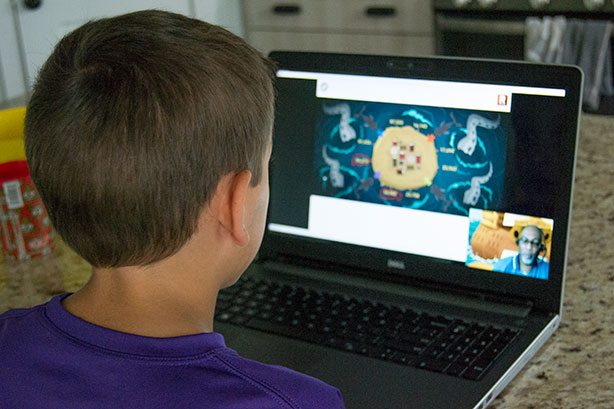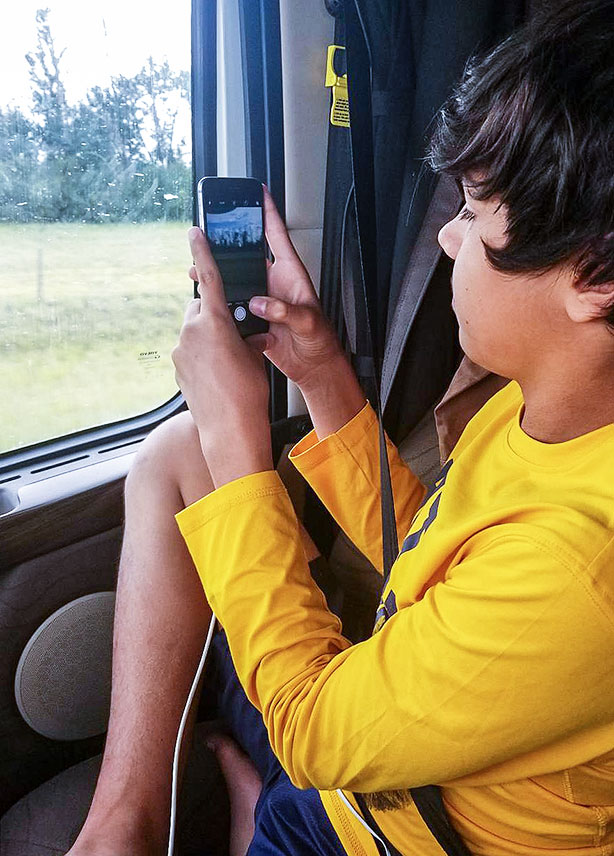It’s 2020 and in this modern age, almost all devices are connected to the internet…that’s just the way it is. It’s inevitable that our children are going to be using the internet on their laptops, tablets, or mobile phones for something or the other. Not only are kids using the internet for their studies and for research purposes, they’re also online watching live streams from their favorite YouTuber or playing multiplayer games with their friends.
With the novel Coronavirus pandemic, connecting to the internet became more important than ever – it was how most of my boys’ schooling was done for the last three months of the year. The Internet was a new concept when I was a child; now, it’s a necessity.
But, as with everything, it’s our responsibility to keep our kids safe from all kinds of harm and the internet can be a dangerous space. It all depends on how we use it and how we communicate about it. Keep these six safety tips in mind when deciding when and how your child uses the internet.
Agree on Rules for Internet Use at Home
Discuss your kids’ requirements regarding their online activities. Have a conversation with them about what they need to be online for and try to understand what’s reasonable for both you and your children. While you want to be safe, you also want to be realistic and allow them time and freedom, depending on their age, to learn about the world of today.
Discuss reasonable time periods of connectivity for your kids. Of course we don’t want our kids connected to the internet 24/7, but they do need sufficient time to get their work done and communicate with their friends.
Make a point of speaking to them about what kind of content, apps, and websites are okay in your family. You’ll obviously want to keep them away from questionable content, so make these boundaries very clear.
While consuming questionable content is not allowed, ensure that they understand that their online behavior is a reflection of themselves. Discuss with them how to behave when they’re messaging friends, gaming, and sending off emails.
Let Your Kids Know that They Can Communicate with You
Regular, open conversation with your kids is important, whether it has to do with the internet or not. In this case, make a point of letting your children know that they can speak to you regularly and openly about what they get up to online. The best way to do this is to initiate these conversations yourself and follow it up to see how they’re doing.
Let them feel that they’re encouraged to speak to you about the online world. Dilemmas in the digital world do occur. As they’re growing and learning, they’re going to encounter issues that they might not feel comfortable about or not know how to react to.
By keeping that line of communication open between you and your kids, you’ll be letting them know that they can approach you regarding any internet safety issues that they might be having. Reassure them that you won’t take their devices away if things like this do occur.
Limit Online Time
By limiting device usage, you’re also limiting the amount of time your kids spend online. Appropriate limitations will all depend on how old your children are and what their activities are like. For many of us, staying home during the COVID-19 pandemic means that time spent online has gone up.
However, life is all about balance. Kids need to balance their screen time and engage in interests that are offline, too. Of course, this ties in with overall health of both kids and adults, but for growing kids, limiting online time comes with being aware of problems that arise from the overuse of technology. Poor eyesight, hearing, and bad posture often stem from sitting in front of screens for extended periods.
If you find your kids flouting your online restrictions quite often, like using apps alone at night when they should be sleeping, this is something you should be concerned about.
Protect Your Kids against Online Predators
One of the first rules of independence we learned as children was probably “don’t talk to strangers.” This is, perhaps, even more important for kids today who can be exposed to many kinds of people online with increased levels of anonymity. It’s important for parents to emphasize to their kids that not everyone online is who they say they are.
Ensure that you, as a parent, know exactly who your children communicate with. In the digital world, a name and last name are not enough – you need to be familiar with your kids’ friends’ contact information, screen names, and email addresses.
Also, it’s vital that you know of any social media platform that your children are on. If you or your kids ever encounter someone unfamiliar who may strike you as suspicious, verify their identity on Nuwber.
Learn About Social Media Platforms
While you might use Facebook regularly, your children probably don’t even have an account. Find out what social media apps your kids and their friends use. And then, go one step further and look into the kind of content that gets created and consumed on these social networks. There are some things that you might not be comfortable with, so it’s vital that you know how your kids are engaging on a digital social level.
It’s also critical to know which of these networks filter adult content and which don’t. There are some sites that don’t filter adult content, meaning that your children have access to just about anything that anyone chooses to share on a particular social media platform. Communicate to your children that their privacy is important and that part of internet safety is limiting information they share on social media, as well as how they behave.
Have Access to Your Child’s Accounts
This is dependent on age, but if you have younger kids, it would be in your best interests to have the login details to all their online accounts. This includes social media accounts, gaming accounts, messaging apps, etc. It helps you to keep tabs on who they’re engaging with and what they’re posting.
Of course, as they get older, privacy is important and both you and your child might not be comfortable with you being able to access their private conversations. Building trust early on helps ensure your child practices basic internet safety without you being there to supervise their every move.
Trying to ensure my boys are safe and respectful online has been one of the biggest challenges I’ve faced as they got older, since the constant connection to the online world wasn’t something I grew up with as a child myself. But so far, I’ve found communication (even when it can be uncomfortable) really is the key. Letting our kids know they can always come to us helps ensure they’re to enjoy and respect the benefits the internet gives them.


